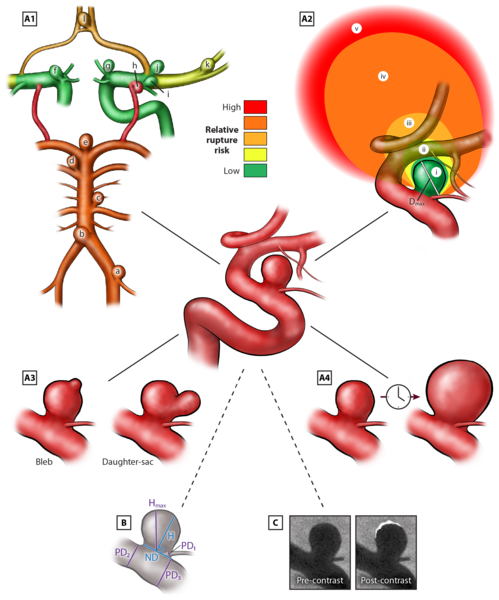Sie befinden sich hier
Inhalt

Professor of Neurosurgery
Clinic Director Neurosurgical Clinic
Neurosurgery
Our translational research in the setting of cerebrovascular diseases investigates the pathogenesis and disease course of cerebrovascular malformations, especially in intracranial aneurysms and arteriovenous malformations, to ultimately establish novel biomarkers and/or preventive therapies.
We mainly pursue six research strategies, i.e. A) bio-sampling during surgical or endovascular treatments of cerebrovascular pathologies, B) molecular biology of extracellular matrix components, C) radiological or serological biomarkers, D) epidemiological time trends and effect of risk factors, E) development of risk models for treatment stratification and F) development of clinical trials. In the setting of intracranial aneurysms, we have endeavored to identify human biomarkers and develop novel molecular imaging modalities as potential surrogates for molecular stability/risk of rupture in intracranial aneurysms. Further, we aim to develop novel preclinical and clinical treatment strategies for prevention of intracranial aneurysms. Here, we facilitate radiocarbon birth dating of molecular components in cerebrovascular pathologies (aneurysms, arteriovenous malformations in relation to cadaveric arteries) to understand the developmental chronology of such entities and determinants for turnover of their main molecular constituents (e.g. collagen type I and elastin).
Central Research Topics
- Human biomarkers for aneurysm stability
- Molecular imaging in aneurysms (in vitro and ex vivo)
- Medical strategies to reduce the risk of aneurysm rupture or growth in patients
- Prevalence/incidence of aneurysms/subarachnoid hemorrhage and risk factors
Selected research projects
Baden Württemberg Ministry of Science, Research and Arts, intramural: Project Healthy Brain: COllageN TurnoverIN Unruptured InTracranial aneurYsms (CONTINUITY) study (with Katharina Hackenberg). Duration: 2021 – 2023
Schwiete foundation: Prospective Randomized Open-label Trial to Evaluate risk faCTor management in patients with Unruptured intracranial aneurysms (PROTECT-U) (NCT03063541). Since: 2017, principal investigator
Selected publications
- Validation of the German version of the subarachnoid haemorrhage outcome tool (SAHOT).
Ziebart A, Abdulazim A, Wenz F, Kleindienst N, Mocarz-Kleindienst M, Galea I, Rinkel GJ, Etminan N. Eur Stroke J. 2023. 8(1):320-327. Doi: 10.1177/23969873221144813 - Prospective Randomized Open-label Trial to evaluate risk faCTor management in patients with Unruptured intracranial aneurysms: Study protocol.
Vergouwen MD, Rinkel GJ, Algra A, Fiehler J, Steinmetz H, Vajkoczy P, Rutten FH, Luntz S, Hänggi D, Etminan N. Int J Stroke. 2018. 13(9):992-998. Doi: 10.1177/1747493018790033 - Collagen turnover in relation to risk factors and hemodynamics in human intracranial aneurysms. Hackenberg KAM, Rajabzadeh-Oghaz H, Dreier R, Buchholz BA, Navid A, Rocke DM, Abdulazim A, Hänggi D, Siddiqui A, Macdonald RL, Meng H, Etminan N. Stroke. 2020. 51:1624-1628. Doi: 10.1161/STROKEAHA.120.029335
- European Stroke Organisation (ESO) guidelines on management of unruptured intracranial aneurysms. Etminan N, de Sousa DA, Tiseo C, Bourcier R, Desal H, Lindgren A, Koivisto T, Netuka D, Peschillo S, Lémeret S, Lal A, Vergouwen MD, Rinkel GJ. Eur Stroke J. 2022. 7(3):V. Doi: 10.1177/23969873221099736
- Worldwide incidence of aneurysmal subarachnoid hemorrhage according to region, time period, blood pressure, and smoking prevalence in the population: A systematic review and meta-analysis.
Etminan N, Chang HS, Hackenberg K, de Rooij NK, Vergouwen MDI, Rin kel GJE, Algra A. JAMA Neurol. 2019. 76:588-97. Doi: 10.1001/jamaneurol.2019.0006 - Unruptured intracranial aneurysms: development, rupture and preventive management. Etminan N, Rinkel GJ. Nat Rev Neurol. 2016. 12:699-713. Doi: 10.1038/nrneurol.2016.150
Kontextspalte
Contact
Medical Faculty Mannheim
Heidelberg University
Theodor Kutzer-Ufer 1-3
68167 Mannheim
nima.etminan@medma.uni-heidelberg.de

